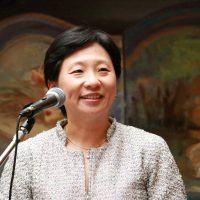I am a physician, scientist, and educator.
I work in a tertiary/quaternary pediatric hospital and am a professor in a major academic centre in North America. I once thought that I lived a fulfilling life: providing the best care to children and their families through direct patient work, generating exciting, new medical knowledge through research, and nurturing new generations of physicians and scientists through teaching, as well as serving my colleagues, hospital, university, and the larger health care system through various leadership positions.
With my drive, determination, and work ethic, I ascended the academic ladder rapidly, being promoted from assistant to associate and then to full professor in fewer than 10 years. I was named a highly coveted endowed Chair at the relatively young age of 40. When I was 45, I became the Chief of Ophthalmology in my hospital and the Vice Chair of Research in my university department. I held multiple prestigious research grants simultaneously for many years, published extensively in top journals in my field, and directed a large laboratory that hired many scientists, engineers, technicians, and students.
I traveled around the world on a regular basis, giving keynote speeches and named lectureships, along with being a visiting professor. I received numerous accolades for my research and teaching endeavours. I felt that I was truly blessed because I would not have accomplished all these without the unyielding support of a loving husband and two adorable sons. Many would say I had reached the pinnacle of success as a physician-scientist while at the same time achieving a fine work—life balance.
But these accomplishments were not enough. I strived to advance upward by pursuing a degree in Master of Business Administration while managing a full workload. Then, something completely unexpected happened. I developed a hearing loss in one ear, four years ago, at age 48. The worst part of it was a constant, 24/7, non-stop ringing in my ear. I could not rest; I could not sleep; I could not have a moment of peace and quiet. I was treated with steroid injections into my ear. I was also put on oral steroids. Not only did they not help, I also developed suicidal thoughts that frightened me to the core.
When all Western treatment options were exhausted, my doctor covertly told me that he did not want to see me anymore. I felt abandoned, desperate, and hopeless inside. But on the outside I put on a brave face and continued to carry out all of my duties, pretending that I could endure all of these challenges with my usual determination and perseverance.
As I suffered deeply inside, I began to see clearly all the sufferings around me. I realized that, despite many successes, our satisfaction seems to be short-lived—soon it diminishes and we find ourselves wanting more. At times, we become unhappy because we don’t get what we want, or we get what we don’t want, or we worry about things not going our way. As I looked around, I felt deeply the stress that my co-workers experience every day from an excessive workload, the agony that we face when making complex and difficult decisions, the moral distress that we witness in the workplace, the tugging at our hearts from our family and relationships as we juggle multiple competing demands, and, ultimately, the suffering that we all have to confront through sickness, old age, and the inevitable demise of our loved ones and eventually our own self.
I started to see more and more vividly the cycles of stress and anxiety that we all encounter, as well as how my own reactivity contributes to these cycles of negativity that affect not only myself but also everyone around me. I began to realize clearly that our well-being does not come from achieving, acquiring, and accumulating. While there is nothing inherently wrong with the rewards that come from hard work, the pitfalls of success come when maintaining these privileges (in my case, a successful medical practice, prestigious academic titles and honours, an esteemed social status, big house, nice car, exotic vacations) become an obligation. At a certain point in time, the pursuit of material possessions, pleasures, praise, and recognition makes life feel hollow. Without awareness and the courage to look deeply or make changes, we may work harder and accumulate more only to find that the happiness and deep fulfilment that we long for remain elusive.
I began to realize that true happiness can come only by examining what’s inside, by investigating the relationship between the external world and our inner self, and by changing our habitual patterns in response to our thoughts, feelings, and emotions. After a long period of reflection—the dark night of my soul—I decided to pursue a different path and do the unthinkable. I stepped down from all the leadership positions before completing my terms. I closed my laboratory. I turned part time. However, my heart was torn because all of these radical changes were incompatible with my deeply ingrained ambition, competitiveness, and perfectionism.
Going through these changes felt like a career suicide, an existential crisis, a mini-death. I kept thinking: What will people think of me? Am I disappointing my hospital staff? How could I be so irresponsible by abandoning many long-time employees whose livelihoods depend on me? Will I ever be trusted again? Am I setting a bad example for my kids and trainees by being a “quitter”? Are the many years of training and the experiences that I have accumulated to finally become a highly specialized expert going to waste? What will be the financial implications? Confronting these questions was painful, heart-rending, and frightening. Unknown to me, my identity, self-worth, and sense of purpose had been wrapped up completely with my roles, titles, and external validation. I asked myself: Who am I really, and what should I do next? I knew deep inside that I must commit to my decision no matter how raw, excruciating, and harrowing the process was.
I began by looking at what I enjoyed most. I realized that what has brought me the most joy was meeting people, listening to them, and serving them in whatever way I could. I also recognized that I have been increasingly drawn to the spiritual needs of the dying, having witnessed and been immersed in some truly life-changing, genuinely human, and amazingly enriching experiences while caring for my dying father, mother-in-law, and mentors. At the same time, I have been practising mindfulness for several years, which has helped me to be stronger, calmer, and more opened to new perspectives. I wanted to delve deeper into its roots that originate in Buddhist traditions. Out of these considerations, I resolved to pursue chaplaincy training with Roshi Joan Halifax so that I could hone my skills to serve others and explore how to care for the dying while at the same time deepen my spiritual practice.
Chaplaincy training has been a deeply healing and transformative experience. I now realize that I must touch deeply into my own pain and sorrow so that I can look clearly into the underlying causes of the inherent unsatisfactoriness of our conventional lives. From a visceral appreciation of the universality of suffering, a deep motivation was aroused in me: to lead an awakened life with integrity, courage, and wholehearted practice, to alleviate the miseries of all beings, and to touch the true nature of reality.
Learning to embrace not knowing, to bear witness to the joys and pain of life, and to discern what is the most skilful action at each moment has been challenging and yet, paradoxically, deeply grounding and nourishing. I can now see acutely that my earlier notion of service, though noble and well-meant, was based on many previously hidden, naïve, and incomplete assumptions and orientations. It was based on the concept of “fixing” what is broken and “helping” what is weak from a position of being better and stronger rather than coming from a deep inner place of humility to serve life as whole. I also notice, despite the best intention to serve, how quickly, easily, and furtively my ego slips in for its own gratification.
I began to understand the main reason why I decided to make such a drastic change in my career: my disillusionment with the health care system. As a leader, I envisioned and attempted to build a more compassionate culture in the workplace where everyone—doctors, nurses, staff, administrators, and all others—comes together not only to serve patients and their families, but also one another so that everyone can live a purposeful, fulfilling, and authentic life.
Although there were some small successes, I was also met with much skepticism, cynicism, or silent acquiescence to the status quo. I pondered deeply inside and explored why I hit many roadblocks by reaching out to colleagues, other health care professionals, and caregivers to learn from their experiences. I researched and investigated why there is so much distress, burnout, and suffering in the health care world. I now have a fuller understanding of the hurdles that caregivers face, as well as some skillful ways to cultivate a compassionate and flourishing life.
~
Please consider Boosting our authors’ articles in their first week to help them win Elephant’s Ecosystem so they can get paid and write more.












Read 4 comments and reply